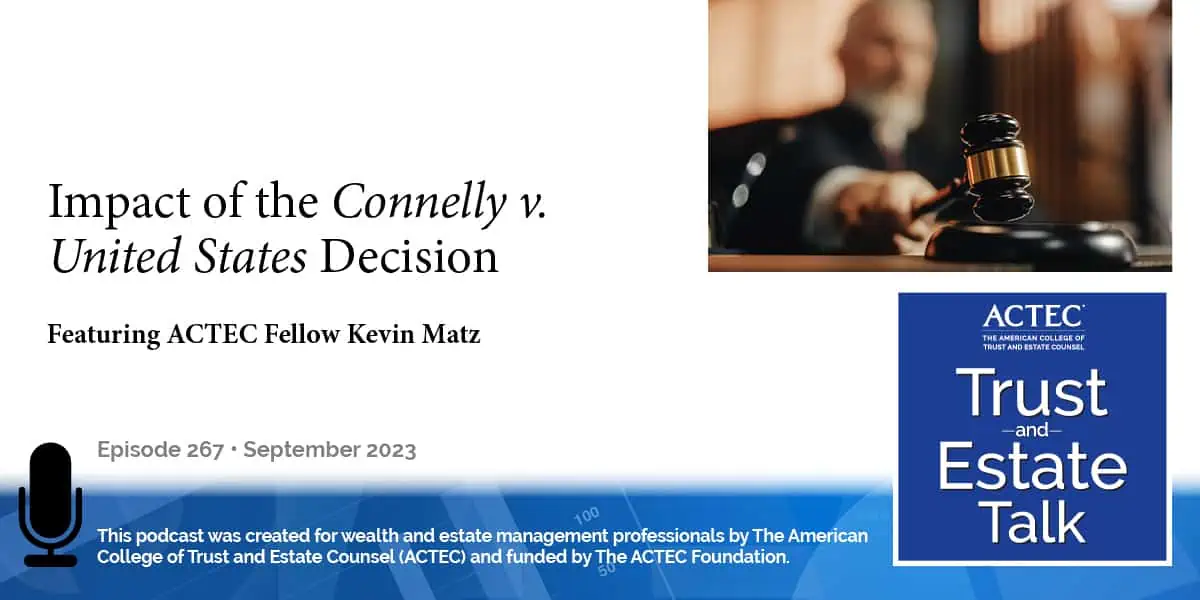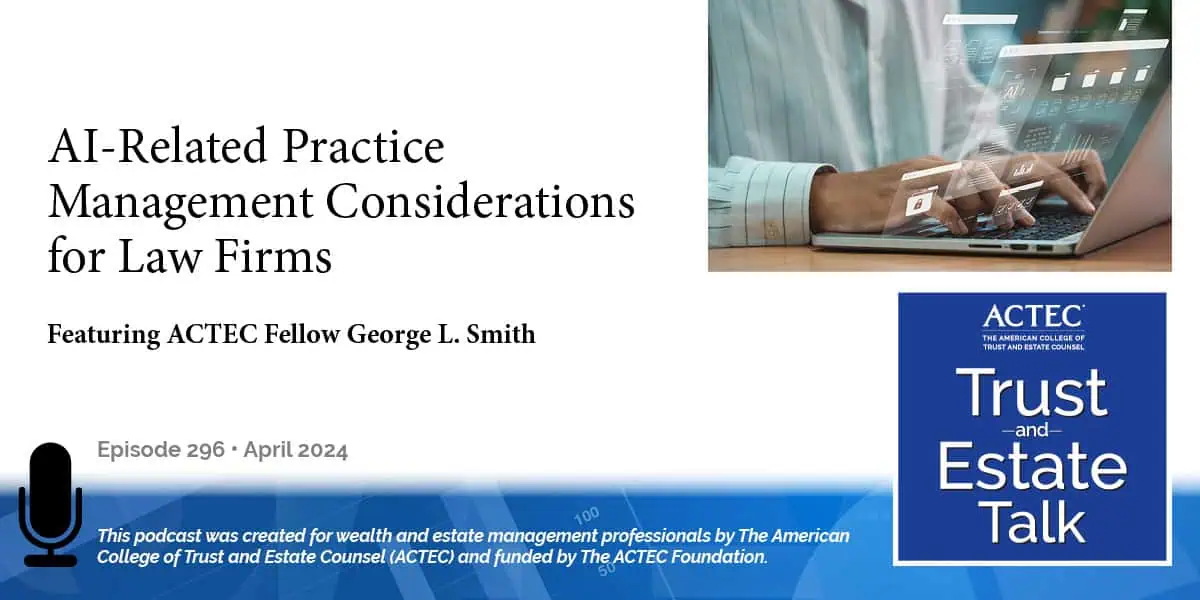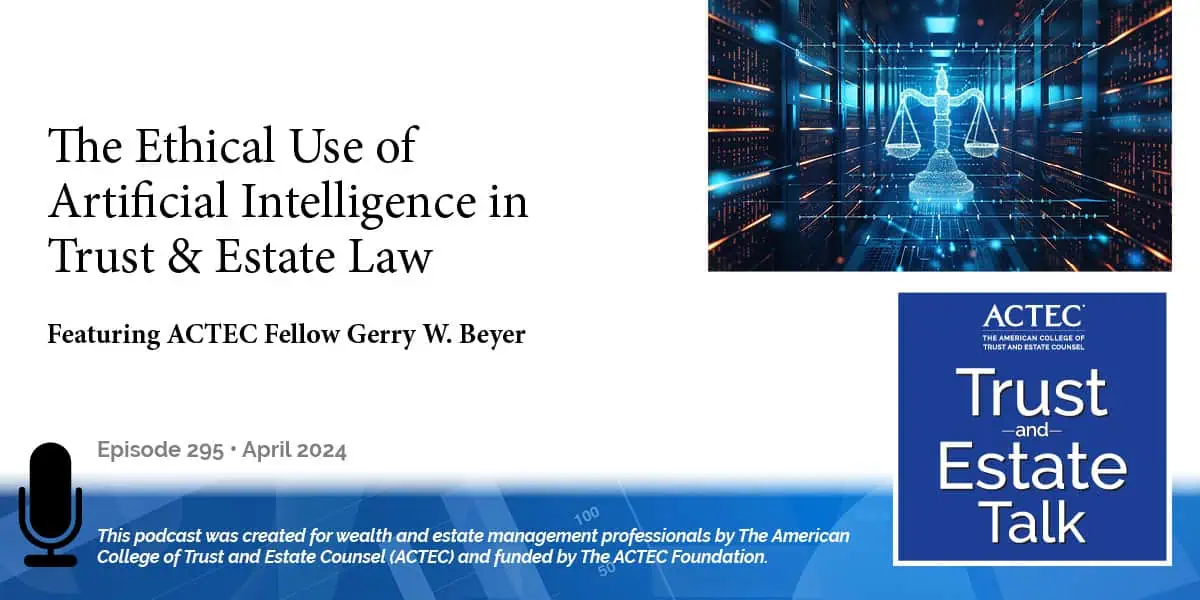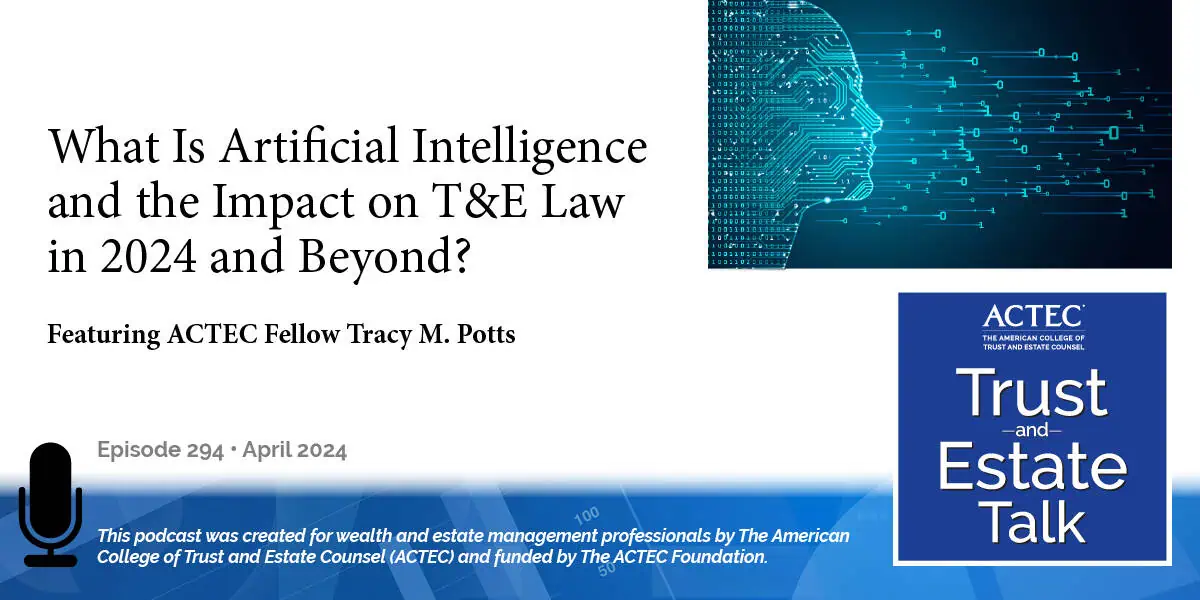Impact of the Connelly v. United States Decision

The “Impact of the Connelly v. United States Decision,” that’s the subject of today’s ACTEC Trust and Estate Talk.
Transcript/Show Notes
This is Travis Hayes, ACTEC Fellow from Naples, Florida. In the early part of June, the U.S. Court of Appeals for the Eighth Circuit affirmed the decision, holding that the fair market value of stock in a closely held corporation, for purposes of valuing that stock in the corporation held by a deceased shareholder’s estate, included life insurance proceeds intended for the redemption of the deceased shareholder’s interest in the company.
ACTEC Fellow Kevin Matz of New York, New York, joins us today to discuss the Connelly decision and why there can be unintended consequences to not paying attention to the terms of a buy-sell agreement. Welcome, Kevin.
Introduction
Thank you, Travis. Hello, everyone. So, in Connelly v. United States, the United States Court of Appeals for the Eighth Circuit, on the taxpayer’s appeal from an order granting summary judgment in favor of the IRS by the United States District Court for the Eastern District of Missouri, considered whether a buy-sell agreement was able to fix the value of the ceiling’s corporate shares for estate tax purposes –short answer, it was not.
Also, whether life insurance proceeds, payable to the corporation to help fund a corporate redemption of shares, needed to be considered in determining the fair market value of the corporate shares for estate tax purposes. And spoiler alert here, it was so considered in determining the fair market value of the corporate shares, importantly, without any offset to take into account the redemption obligation to the decedent’s estate – we’ll talk more about that later – under a buy-sell agreement.
Background and Facts in Connelly
Here are the facts. So, you have brothers Michael and Thomas Connelly, and they were the only shareholders in Crown C Supply, Inc.- referred to as Crown- a closely held family business that sold roofing and siding materials. Michael owned approximately 77% of the company’s shares, while Thomas, brother Thomas, owned approximately 23% of the company shares. The brothers entered into a stock purchase agreement that gave the surviving brother the right to buy the decedent’s shares.
Now, if the surviving brother declined, then Crown, the company, was required to buy back the shares of the first brother to die, and the company bought a $3.5 million life insurance policy on the life of each brother to ensure that it had enough cash to make good on the agreement.
Now, the stock purchase agreement provided two mechanisms for determining the price for which Crown would redeem the shares. The principal mechanism required the brothers to execute a new certificate of agreed value at the end of every year, which set the price per share by “mutual agreement.” If they failed to do so, the brothers were supposed to obtain two or more appraisals of fair market value. But the brothers never executed a certificate of agreed value or obtained appraisals as required by the stock purchase agreement.
Now, Michael died in October 2013 and the company repurchases shares, which constituted an approximately 77% ownership interest in the company, for $3 million. The rest of the life insurance proceeds, that is $500,000, went to fund the company’s operations. Michael’s estate paid estate taxes on the shares in the company.
Now, the IRS they assessed additional estate taxes of over a million dollars. Thomas, the surviving brother, as executor of his deceased brother’s, estate, paid the deficiency and then filed suit in Federal District Court for the Eastern District of Missouri seeking a refund. At the core of the dispute was the question, of the proper valuation of the company on the date of Michael’s death. Now, aside from the life insurance, the company was worth approximately $3.3 million on the date of Michael’s death. On that date, the company had an obligation to repurchase Michael’s shares from his estate. Also on that date, the company became entitled to receive $3.5 million in life insurance proceeds.
Section 2703 Analysis
So, starting in the lower court, the U.S. District Court for the Eastern District of Missouri. Now, the first question presented in this case, initially before the United States District Court for the Eastern District of Missouri on a motion for summary judgment, was whether the buy-sell agreement was effective to fix the price of the shares for estate tax purposes under Section 2703 of the Internal Revenue Code. The District Court held that it was not. In order for a buy-sell agreement to fix value for estate tax purposes under Section 2703, a series of requirements must be satisfied.
First, under the statutory requirements of Section 2703, there (i) must be a bona fide business arrangement, (ii) the agreement must not be a device to transfer property to the family for less than full adequate consideration, and (iii) the agreement must be comparable to similar agreements negotiated at arm’s length between unrelated parties. In addition, there are the following additional requirements under the Section 2703 regulations and the case law. There must be a fixed and determinable offering price, the agreement must be binding both during life and after death, and there must be a bona fide business reason. There must not be a testamentary disposition for less than full and adequate consideration.
Now, with respect to the statutory requirements of Section 2703, the District Court concluded that although the buy-sell agreement was a bona fide business arrangement, it was a device to transfer property to the family for less than full and adequate consideration, in part because the parties ignored the appraisal requirement under the agreement and basically picked a $3 million redemption price for the shares.
Valuation of Life Insurance Proceeds
In addition, the taxpayer could not show that the agreement was comparable to similar agreements entered into between unrelated parties at arm’s length. Accordingly, the $3 million redemption price for the buy-sell agreement was not binding to fix the value of the shares for federal estate tax purposes. Further, the District Court also noted that the agreement was not fixed and determinable, the determining value, as the parties did not treat it as such, and that the party’s conduct demonstrated that the stock purchase agreement was not binding after Michael’s death. Accordingly, the District Court concluded that the stock purchase agreement did not fix the company’s value for estate tax purposes.
The District Court next considered the second question of whether life insurance proceeds owned by and payable to the company should be considered value in the company. The estate relied upon the decision of the U.S. Court of Appeals for the Eleventh Circuit- a different circuit- in the Estate of Blount, which had reversed the tax court in holding that the fair market value of a closely held corporation did not include life insurance proceeds on the grounds that the stock purchase agreement created a contractual obligation, or rather, a contractual liability for the company, which offset, to that extent, the life insurance proceeds.
Now, the District Court in Connelly rejected the Eleventh Circuit’s approach in Blount, finding that the Eleventh Circuit’s approach in Blount was “demonstrably erroneous,” and that there are “cogent reasons for rejecting it.” The court in Connelly – again, this is a District Court – focused on what a hypothetical willing buyer would pay for a company subject to redemption obligation.
I concluded that it would not factor the company’s redemption obligation into its assessment, of the value of the company, because when they purchased the entire company, the buyer would acquire all the shares, and would be redeemed on the redemption obligation. According to the District Court, as a result, the buyer’s redemption obligation would be owed solely to itself. Now, hold on a second here, just taking a step back. That actually is not correct. Okay, because the payment obligation was to deceased brother Michael’s estate that’s looking to get the $3 million that is owed.
So, the court, then, continued that the company could choose to cancel this obligation if it did not wish to change the company’s capital structure, or alternatively, receive the equivalent of a distribution from the company, leaving the buyer in the same economic position as if a redemption obligation had been canceled.
The District Court in Connelly therefore construes the redemption obligation as not constituting a corporate liability for estate tax purposes. It therefore held that the life insurance proceeds used to redeem the decedent’s shares in the company must be included in determining the fair market value of the company, and therefore, determine the fair market value of the decedent’s shares of stock in the company, importantly, without any offset related in the company’s redemption obligation for the shares.
Eighth Circuit Decision
Now, we take it up a step to the recent decision in June of this year, 2023, in the Eighth Circuit Court of Appeals. So, for the estate appealed, the District Court’s granted a summary judgment in favor of the IRS, and the U.S. Court of Appeals for the Eighth Circuit affirmed the District Court.
Now, on the issue of the applicability of Section 2703, the Eighth Circuit focused on the fact that the stock purchase agreement fixed no price, nor prescribed a value for arriving at one. It merely laid out two mechanisms by which the brothers might agree on a price. One was the certificate of agreed value, in which the Eighth Circuit regarded as nothing more than an agreement to agree. The other was an appraisal process for determining the fair market value of Crown. As to this, the Eighth Circuit noted that there’s nothing in the stock purchase agreement, aside from minor limitations and valuation factors, that fixes or prescribes a formula or measure for determining the price that the appraisers will reach.
Instead, the agreement required only that the appointed appraisers independently determine and submit their appraisals to the fair market value of the company and the brothers were supposed to average results or consult a third party as a tiebreaker. None of this was ever done. Thus, the buy-sell agreement was not binding to fix the value of the shares for federal estate tax purposes under Section 2703, because the agreement was not fixed and determinable in determining value due to the parties failing to treat it as such. Interestingly, none of the other grounds raised by the District Court in the Section 2703 analysis were mentioned by the Eighth Circuit.
So, on the issue of the fair market value, the decedent Michael Connelly’s shares in Crown, the Eighth Circuit, similar to the District Court, phrase the issue as whether the life insurance proceeds received by Crown and intended for redemption, should be taken into account when determining the corporation’s value at the time of Michael Connelly’s death.
Now, the Eighth Circuit emphasizes that in valuing a closely held corporation, the regulations under Section 2031 require that consideration shall also be given to non-operating assets, including proceeds of life insurance policies payable to, or for the benefit of the company. In this regard, the Eighth Circuit stated that although not directly applicable, Section 2042 helps to illuminate what it means to take into account life insurance proceeds for Section 2031 purposes, including in valuing a corporation stock that is affected by the receipt of life insurance proceeds for purposes of the willing buyer, willing seller test.
Now, the Eighth Circuit, then, tackled head on the Eleventh Circuit’s decision in the Estate of Blount. The Eighth Circuit in Connelly observed that the Eleventh Circuit in Blount had concluded that the life insurance proceeds have been accounted for by the redemption obligation and that the Eleventh Circuit in Blount views life insurance proceeds as an asset directly offset by the liability to redeem shares — yielding zero effect whatsoever in the company’s value.
Now, according to the Eighth Circuit, the Blount court’s premise that an offsetting liability should be recognized due to the corporation’s obligation to redeem shares is flawed, because an obligation to redeem shares is not a liability in the ordinary business sense, but it’s that, simply, reduction to corporate surplus. According to the Eighth Circuit in Connelly: “Consider the willing buyer at the time of Michael’s death. To own Crown outright, the buyer must attain all of its shares. At that point, he could then extinguish the stock purchase agreement or redeem the shares from himself.” Emphasis on “from himself.”
Alternative Analysis
“This is just like moving money from one pocket to another. There’s no liability to be considered. The buyer controls the life insurance proceeds.” Now, taking a step back, again, that’s not factually correct, because Crown, now owned by surviving brother Thomas Connelly, is redeeming shares from deceased brother Michael’s estate and paying $3 million to brother Michael’s estate in cash, which no longer has any ownership interest in Crown.
Okay, now, the court continued, “A buyer of Crown would therefore pay up to $6.86 million, having taken into account the life insurance proceeds, and extinguish or redeem as desired. On the flip side, a hypothetical willing seller of Crown holding all 500 shares would not accept only $3.86 million knowing that the company was about to receive $3 million in life insurance proceeds, even if those proceeds were intended to redeem a portion of the seller’s own shares.” Again, this point to emphasize. It was the estate’s shares and money had to go out to pay that. So, on this basis, the Eighth Circuit affirms the District Court’s grant of a summary judgment in favor of the IRS.
Observations
Now, some observations. The critical distinction in the analysis between Blount and Connelly, lie in the recognition or non-recognition of an offsetting liability to implement the redemption obligation under the buy-sell agreement? The Eleventh Circuit in Blount recognized an offsetting liability for such a redemption obligation, while the Eighth Circuit in Connelly did not.
But I ask, is this a complete analysis, however, or is there something else that may be missing? I think that a correct analysis, in a conceptual sense, putting the Court’s decisions aside, would be to allow the offset for such liability in determining the value of the corporate stock, but then recognize, for estate tax purposes, a corresponding asset to the estate in the form of a receivable, equal to the amount of the redemption payment obligation. Now, the Connelly court’s denial of an offsetting liability for this corporate obligation to pay out cash to the estate, in connection with the redemption transaction, seems to be functioning as somewhat of a proxy for this approach.
It’s seemingly an imperfect proxy, however, because the value of the corporate stock, attributable to life insurance proceeds, is then multiplied by the estate’s ownership interest percentage in the corporation’s stock in determining the stock’s estate tax value that’s attributable to it, subject to discounts that may potentially apply depending upon the circumstances, including due to lack of control, or lack of marketability. While, on the other hand, the receivable associated redemption payment obligations under the buy-sell agreement would not be similarly adjusted based on ownership interest.
In any event, in sum, given the split that we have in the circuits, this is very likely not the last we’ve heard of this issue. Stay tuned, as they say. Thank you.
Travis Hayes: Thank you, Kevin, for educating us about the recent Connelly v. United States decision.
You may also be interested in:
- 2022 Hot Topics in Trust and Estate Law (May 2022)
- Owner Control, Operations, and Shareholder Agreements (Sept 2018)
Latest ACTEC Trust and Estate Talk Podcasts

AI-Related Practice Management Considerations for Law Firms
A discussion for law firms about how to incorporate AI in their practice management, including staff considerations, the “billable hour,” and more.

The Ethical Use of Artificial Intelligence in Trust & Estate Law
A law professor offers insights into the risks, rewards, duties and ethical considerations of lawyers using AI in their T&E practices.

What Is Artificial Intelligence and the Impact on T&E Law in 2024 and Beyond?
A primer on the types and uses of AI, then a deeper dive into the impact on trust and estate law from types to applications to ethical considerations.

